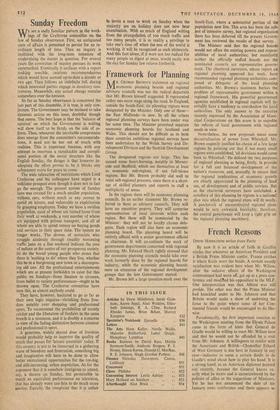Framework for Planning
The designated regions are large. This has caused some heart-burning, notably in Mersey- side and Sheffield, which see themselves at least as economic sub-regions, if not full-blown regions. But Mr. Brown probably did well to resist sub-regional pressure, since there is a short- age of skilled planners and experts to staff a multiplicity of areas.
In the regions there will be economic planning councils. In an earlier statement Mr. Brown re- ferred to them as advisory councils. They will have no executive powers, They will comprise representatives of local interests within each region. But these will be nominated by the Minister: they will not be locally chosen dele- gates. Each region, will also have an economic planning board. The planning board will be entirely official with a senior government official as chairman. It will co-ordinate the work of government departments concerned with regional planning. Mr. Edward Heath' rightly stressed that the economic planning councils would take over work formerly done by the regional boards for industry, while the economic planning boards were an extension of the regional development groups that the late Government started.
Mr. Brown left a large question-mark over the
South-East, where a substantial portion of the population now liye. This area has been the sub-
ject of intensive survey, but regional organisation there has been deferred till the present Govern- ment has reviewed the results of that survey.
The Minister said that the regional boards would not affect the existing powers and respon- sibilities of local authorities; but manifestly neither the officially staffed boards nor the nominated councils are representative govern- ment. The chartered surveyors, whose report, on regional planning appeared last week, have, recommended regional planning authorities com- posed of delegates of the local planning authorities. Mr. Brown's statement burkes the problem of representative government within a regional framework. His powerful government agencies established in regional capitals will in- evitably have a tendency to overshadow the local authorities. The only answer to the anxieties recently expressed by the Association of Muni- cipal, Corporations on this score is to expedite the reform of local government with regional needs in view.
Nevertheless, the new proposals mean some decentralisation of power from Whitehall. Mr. Brown cogently justified his choice of a few large regions by pointing out that if too many small regions were established, 'all decisions would come back to Whitehall.' He defined the two purposes of regional planning as being,-firstly, to provide for a full and balanced development of the nation's resources, and, secondly, to ensure that the regional implications of economic growth are clearly appreciated in the planning of land use, of development and of public services. But as the chartered surveyors have concluded, a corollary of this planning by regions is a national plan into which the regional plans will fit neatly. A patchwork of uncoordinated regional plans would be very .awkwai'd.. Inevitably, therefore, the central goyernment will keep a tight grip on the regional planning machinery.




























 Previous page
Previous page